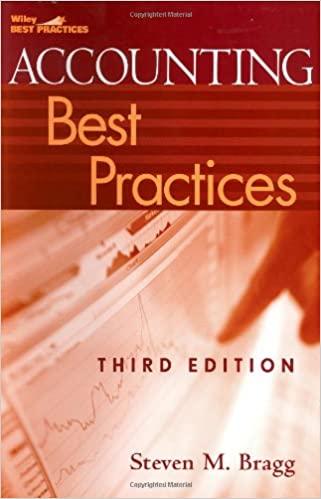Question
Rebound Sports, Team Project You were just promoted to CFO of Rebound Sports, a publicly traded sporting goods manufacturing company. You have been tasked with
Rebound Sports, Team Project
You were just promoted to CFO of Rebound Sports, a publicly traded sporting goods manufacturing company. You have been tasked with helping the company improve its financial statements as part of its push to gain back investor confidence. The share price of the company from the beginning of the year until now has dropped from $30 per share to $20 per share and the board of directors is concerned.
Youll need to rely on your understanding of the financial statements and which numbers and ratios investors value to lead a winning change at your organization while also observing generally accepted accounting principles (US GAAP). Simply hoping that market conditions improve will not be adequate.
Youll need to financially discipline the company by advising the executive team on decisions that will lead to greater financial health. Youll also need to ensure avoid fraudulent accounting practices. Remember, the primary source for US GAAP is the FASBs accounting standards codification (ASC) online. Also relevant for public companies are SEC comment letters and enforcement actions, which I have included where appropriate in the case.
The executive team needs your advice regarding 6 accounting issues (listed below). You will assess each issue, analyzing how it would affect the financial statements and analysis ratios. Your analysis should be more thorough than simply stating which accounts are affected and whether they increased or decreased. Current financial statements are included in the attached Excel file, Rebound Financial Statements. I have included the relevant FASB ASC reference for each of the accounting issues so you can follow the appropriate US GAAP. Remember, some US GAAP leaves room for manager judgment. In deciding how to handle the accounting issues, you should consider both the short-term goal of improving the financial performance of the company AND what is best for the company and its investors long-term.
The issues on the table for discussion include the following:
- Year-end Sales Push: In the 4th quarter of the year, the CEO would like to give deep sales discounts to customers to encourage them to stock up on more of the companys products (channel stuffing). Customers can pay in the subsequent year, which would put all sales into receivables. The customers could keep the inventory they purchase in the companys warehouses until they are ready to receive it (a bill-and-hold arrangement). This would bring in an estimated $1,000,000 in Sales at the end of the year with an estimated $500,000 in COGS.
- Relevant US GAAP: ASC 606-10-55-81 through 84 (Bill-and-Hold Arrangements); SEC AAER Release No. 1393 in 2001 regarding channel stuffing and bill-and-hold sales by Sunbeam Corporation.
- Textbook guidance on accounts affected: Chapter 5, LO 5-1
- Bad Debts Estimate: The Accounts Receivable department has submitted to you a report of the state of collections. They estimate that the bad debt allowance should be increased by somewhere between $90,000 to $150,000.
- Relevant US GAAP: ASC 310-10-35-7 through 10
- Textbook guidance on accounts affected: Chapter 5, LO 5-6
- Slow-moving Inventory: A competitor recently developed a widely popular customizable volleyball with superior materials and design at a price point close to Rebounds, so volleyball sales at Rebound Sports have declined by 50%. Its likely that the company will not be able to sell all of its $400,000 in volleyball inventory unless it gives large discounts, with the net realizable value being anywhere from 25% - 70% below Rebounds current recorded inventory cost. You must decide how much to write inventory down by.
- Relevant US GAAP: ASC 330-10-35
- Textbook guidance on accounts affected: Chapter 6, LO 6-9
- Depreciation Estimate: On January 1st of the current year, an $11 million rubber forming machine was purchased with $0 residual value estimated (already included in the inventory balance). Assets of this type typically depreciate over a period of 10-15 years. You must decide the rate at which to depreciate this asset and record the corresponding initial depreciation entry in the current year.
- Relevant US GAAP: ASC 360-10-35-2 through 4
- Textbook guidance on accounts affected: Chapter 7, LO 7-4
- Legal Contingency: Last month, the companys legal team advised the executive team that there was a 75% chance of the company losing a litigation suit of $1 million. You must decide whether or not to recognize this contingent liability and if so, at what amount.
- Relevant US GAAP: ASC 450-20-05
- Textbook guidance on accounts affected: Chapter 9, LO 9-4
- Dividend: the board has proposed a dividend of $1 per share to investors (not yet declared), however they have not yet finalized this. They are open to your suggestion regarding alternate amounts if necessary. Competitors in your industry last year paid anywhere from $0.25 to $2 per share in dividends. Last year the dividend paid was $.50 per share (which amounted to $200,000 total distributed to Rebounds 400,000 shareholders).
- Textbook guidance on accounts affected: Chapter 10, LO 10-5
please answer 5 & 6 from the above.
Step by Step Solution
There are 3 Steps involved in it
Step: 1

Get Instant Access to Expert-Tailored Solutions
See step-by-step solutions with expert insights and AI powered tools for academic success
Step: 2

Step: 3

Ace Your Homework with AI
Get the answers you need in no time with our AI-driven, step-by-step assistance
Get Started



